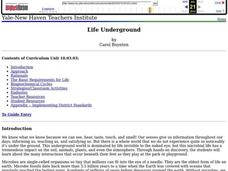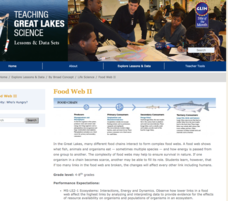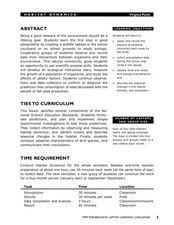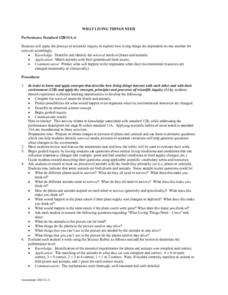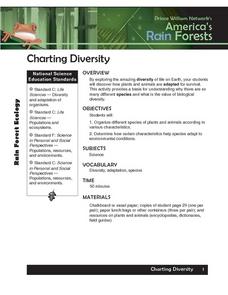Curated OER
The Columbian Exchange
Tenth graders examine the consequences of Spanish exploration of the New World on animals, humans, and plants. They read and discuss an informational handout, define key vocabulary terms, and complete a Venn Diagram with Old World and...
Curated OER
The Columbian Exchange
Eleventh graders examine the significant consequences of Spanish exploration and settlement of the New World on animals, humans, and plants. They read and discuss an informational handout, define key vocabulary terms, and complete a...
Curated OER
TE Lesson: How Clean is that Water?
Students examine the factors the affect water quality, and allow for animals and plants to live. They look at how engineers apply water quality information when making stream modifications in order to ensure drinking water quality. They...
Curated OER
Endangered Species
Students watch video clips of endangered animals. They imagine a small garden in front of a house and describe the living and non-living things that could interact to make up a garden eco-system.
Curated OER
Mountains: A Drama Exploration
Students dramatize the formation of mountains. In this earth formation dramatization lesson, students read Anne Issacs', Swamp Angel, and research the how the layers of the Earth move to form landforms. They work in groups to dramatize...
Curated OER
Life Underground
First graders build a terrarium in order to observe animal and plant life dynamics. In this biology lesson plan, 1st graders compare how organisms survive in different environments. They write their observations and analysis in their...
Curated OER
The Circle of Life
Fourth graders examine how the different organisms living in an ecosystem affect one another. In groups, they research a specific ecosystem and present their findings to the class based on the type of organisms found in it. To end the...
Michigan Sea Grant
Food Web II
A food web consists of complex food chains and the more complex the web, the better likelihood of survival. Learners compare and contrast food webs and food chains and discuss concepts like the predator-prey and consumer-producer...
Curated OER
The Tropical Rain Forest
Young scholars use various web sites to access information about the rain forest. They use the Tropical Rainforest Interactive CD to make their own rain forest pictures and stories and learn facts about the rain forest. They use various...
Curated OER
Bats and Boas Abound
Students investigate Puerto Rican boa constrictors and bats. For this animal science lesson, students read an article about the bats and snakes found in Puerto Rico. Students use various art supplies to create a diorama of the habitat of...
Curated OER
Bugs in the Woods
Second graders identify insects and plants in the forest ecosystem in a structured field trip with stations and activity booklets. In this bugs instructional activity, 2nd graders explore the ecosystem of the forest, complete the...
Curated OER
Habitat Dynamics
Students develop an interactive diary to record bird seed consumption. In this habitat instructional activity, students predict and record the amount of birdseed eaten each week by birds.
Curated OER
"Habitats"
Students complete a unit of lessons on animals and animal conservation. They observe a square meter of ground outside the school, set up a model environment, analyze an owl pellet, grow bread mold, and explore various websites.
Curated OER
Retelling the Tiny Seed
Here is a very age appropriate idea that can be stretched, modified, or used as is. Learners review plant parts, discuss pollination, read the story The Tiny Seed, and write a retell sentence. Their sentences describe to way a seed...
Curated OER
Habitats
Students identify butterfly habitats. In this butterfly habitats lesson plan, students read and discuss Where Butterflies Grow. Students study pictures and guess which are butterfly habitats. Students list the life needs of butterflies...
Chicago Botanic Garden
Nature Walk and Ecosystem Introduction
A food web has no organism higher than a tertiary consumer because there wouldn't be enough energy left to sustain them. The fourth installment in a seven-part series begins with a nature walk to get pupils thinking about their...
Curated OER
Habitat Mural
Students build a collage of an ecosystem. The goal is for them to understand interactions in a community, plant and animal adaptations, and how all life depends on plants. This activity is based on Wump World and students describe what...
Curated OER
Creature Features
Young scholars examine why certain animals live in only specific places throughout the world. Using animals, they classify them based on their characteristics and identify their basic needs. They also observe and compare the life cycles...
Curated OER
Where are the Dinosaurs?
Students find the similarities of dinosaurs and the animals of today. In this dinosaurs lesson, students understand why dinosaurs have become extinct. Students research and create dinosaur dioramas and finger puppets.
Curated OER
Organisms and Their Environment
Students observe elements of a local ecosystem and gain an understanding of what elements make up an ecosystem. In this ecosystem lesson plan students create a class food web that shows the interactions among the elements of the...
Curated OER
Forest Food Web Activity
Students gain knowledge of food webs and ecological interconnections in the forest, and place different life forms in their proper place in a food chain. Students appreciate the balance of nature and how humans are affected by extinct...
Curated OER
What Living Things Need
Students apply the process of scientific inquiry to explore how living things are dependent on one another for survival. They match animals with their generalized food source. Students predict what happens to the organisms when their...
Curated OER
Populations and Ecosystems
Sixth graders examine the factors that influence the stability of ecosystems. They construct a miniature ecosystem in a jar that includes plants, small fish, and snails, record the population changes over a period of four weeks, and...
Curated OER
Charting Diversity
Students organize different species of plans and animals according to various characteristics. Students then determine what characteristics enable them to survive in their habitat. Game ideas and activities are included.







